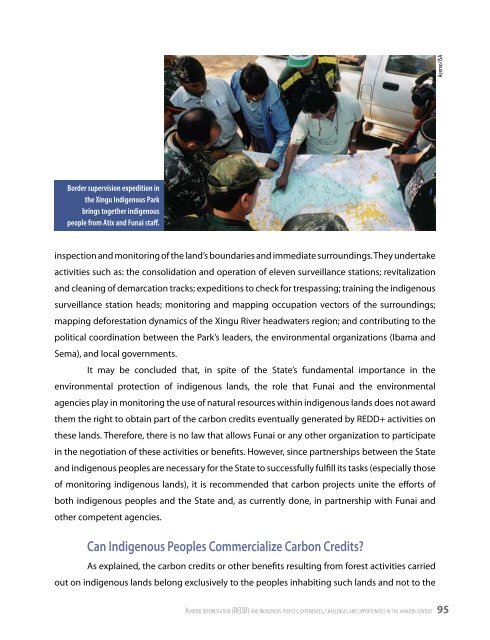Avoided Deforestation (REDD) and Indigenous ... - Amazon Fund
Avoided Deforestation (REDD) and Indigenous ... - Amazon Fund
Avoided Deforestation (REDD) and Indigenous ... - Amazon Fund
You also want an ePaper? Increase the reach of your titles
YUMPU automatically turns print PDFs into web optimized ePapers that Google loves.
Border supervision expedition in<br />
the Xingu <strong>Indigenous</strong> Park<br />
brings together indigenous<br />
people from Atix <strong>and</strong> Funai staff.<br />
inspection <strong>and</strong> monitoring of the l<strong>and</strong>’s boundaries <strong>and</strong> immediate surroundings. They undertake<br />
activities such as: the consolidation <strong>and</strong> operation of eleven surveillance stations; revitalization<br />
<strong>and</strong> cleaning of demarcation tracks; expeditions to check for trespassing; training the indigenous<br />
surveillance station heads; monitoring <strong>and</strong> mapping occupation vectors of the surroundings;<br />
mapping deforestation dynamics of the Xingu River headwaters region; <strong>and</strong> contributing to the<br />
political coordination between the Park’s leaders, the environmental organizations (Ibama <strong>and</strong><br />
Sema), <strong>and</strong> local governments.<br />
It may be concluded that, in spite of the State’s fundamental importance in the<br />
environmental protection of indigenous l<strong>and</strong>s, the role that Funai <strong>and</strong> the environmental<br />
agencies play in monitoring the use of natural resources within indigenous l<strong>and</strong>s does not award<br />
them the right to obtain part of the carbon credits eventually generated by <strong>REDD</strong>+ activities on<br />
these l<strong>and</strong>s. Therefore, there is no law that allows Funai or any other organization to participate<br />
in the negotiation of these activities or benefits. However, since partnerships between the State<br />
<strong>and</strong> indigenous peoples are necessary for the State to successfully fulfill its tasks (especially those<br />
of monitoring indigenous l<strong>and</strong>s), it is recommended that carbon projects unite the efforts of<br />
both indigenous peoples <strong>and</strong> the State <strong>and</strong>, as currently done, in partnership with Funai <strong>and</strong><br />
other competent agencies.<br />
Can <strong>Indigenous</strong> Peoples Commercialize Carbon Credits?<br />
As explained, the carbon credits or other benefits resulting from forest activities carried<br />
out on indigenous l<strong>and</strong>s belong exclusively to the peoples inhabiting such l<strong>and</strong>s <strong>and</strong> not to the<br />
Av o i d e d d e f o re s t A t i o n (redd) A n d i n d i g e n o u s p e o p l e s: experiences, chAllenges A n d o p p o r t u n i t i e s in t h e A m A zo n c o n t e x t 95<br />
Acervo/ISA
















